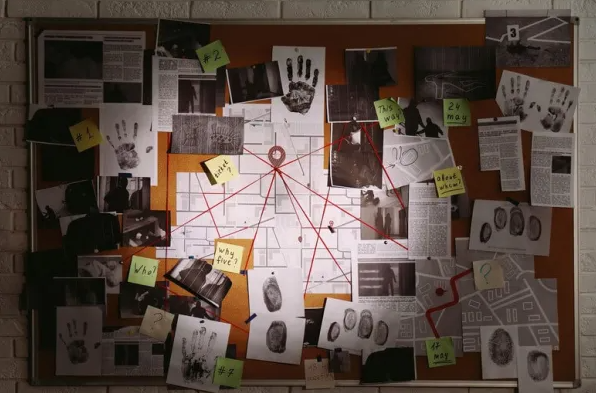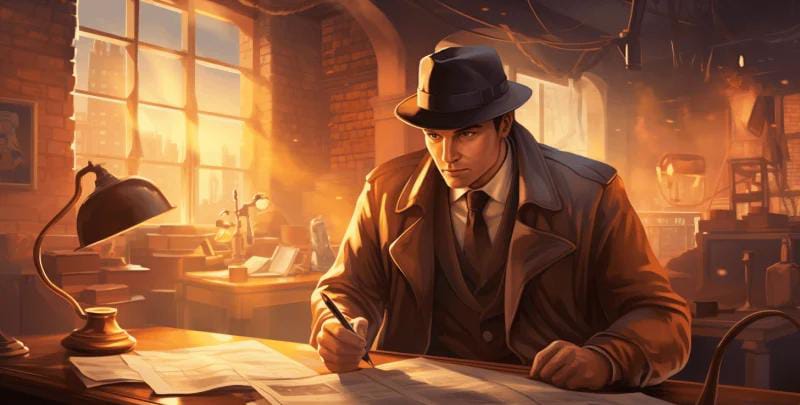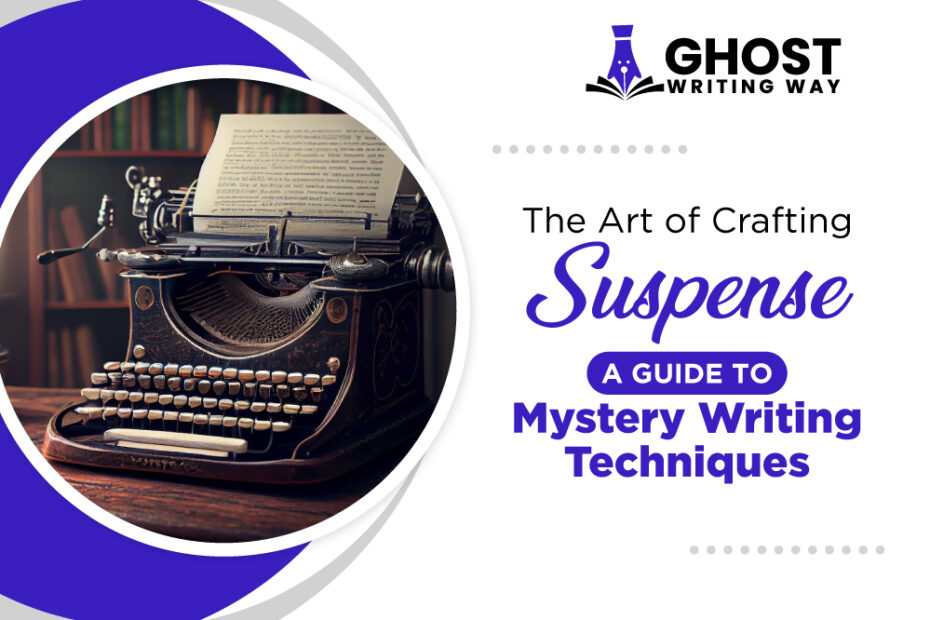Have you ever experienced that thrilling moment in a book where you’re convinced the villain is the culprit, only to be blindsided when the hero turns out to be the murderer? That’s the magic of suspenseful books and mystery novels. Perhaps you’re someone who adores diving into the world of mystery writing book, crafting intricate plots and unexpected twists. You may have the perfect story brewing in your mind, yet struggle to translate it onto paper due to a lack of writing prowess. But fear not, for there are custom book writing services available to bridge that gap.
Don’t despair; we have the solution for you. If you’re not confident in your writing abilities, fear not. Ghostwriting services are the answer to turning your ideas into tangible works of literature. Join us on a transformative journey where we reveal how ghostwriting experts can assist you in realizing your aspirations of becoming a mystery writer. Our team of skilled ghost book writers will not only bring your vision to life but also mentor you in refining your craft, ensuring your stories captivate readers with every twist and turn.
Mystery Genre

A mystery genre is a category that involves stories that revolve around characters that are like puzzles typically a crime event. It has subgenres like detective fiction, cozy mysteries, and psychological thrillers among others.
Some of the key features of the mystery genres are:
Investigation
The investigation process takes down one or more characters. There is a detective included to undercover the truth, Undertake the suspect, and solve the mystery.
Mystery and Puzzle
The heart of the mystery story is how the mystery writers puzzle readers. They could puzzle readers by creating a narrative of a crime scene, theft, or disappearance of a person.
Twist and Turn
Twists and trunks are important things in a mystery writing fiction. These twists can challenge assumptions, expectations, or complexity in the story.
Character Driven
Developing a well-structured character-driven story in the mystery novel is essential to keep the readers engaged in reading and making their narratives. The character must contain multi-dimensional qualities so that readers can assume things about the character.
Resolution
A mystery’s resolution is crucial, revealing truths through a climactic reveal or confrontation that ties loose ends. It offers closure but also opens up new mysteries to explore in future series, keeping readers engaged.
How to Write a Mystery?

Writing a story that involves simple characters might be easy but a mystery writing can be a tough job. You have to make sure you grab the audience’s attention and present the story in a way that makes the audience read faster yet slowly so they can know is the main culprit and slow because they do not want to good book to end.
Here is a guide on how you can write a mystery book.
Brainstorm Your Idea
When you develop an idea about the mystery writing start brainstorming about it. Consider what type of mystery story you will write. Generate an idea of how your story will puzzle people and make the story engaging. Consider what type of mystery you want to write like Murder mystery, disappearance, or theft.
Create Complex Character
Develop a cast of characters with diverse personalities and qualities. Make the complex character so that when people start reading about that character they think of him/her as the murderer or the main culprit and bring the twist by making him/her innocent.
Leave Hints and Clues
Leave hints and clues to bring the reader to the solution of the story. The clue could be the physical evidence, witness, or character action in the story. At the same time introduce false clues or misleading information that will confuse the readers and they will keep guessing about the story.
Build Suspense
Create a suspenseful and tense moment to keep the reader engaged and eager to undercover the truth. Create a sense of introducing obstacles and raising the shake by your character. Create unexpected turns to create momentum to keep the reader engaged in the mystery book.
Use Strategy to Reveal the Information
Plan a strategy to reveal the information. Make a strategic plan so that the reader does not get all the information at once. Gradually reveal the information and make progress in the story.
Write a Resolution
Resolution is the final act of mystery writing. Tie together all the loose ends of mystery and reveal the truth. Provide a satisfactory resolution by explaining in detail how the crime was committed. Make sure the ending is logical and supported by the clues you have planned throughout the story.
How to Write a Good Mystery?

Writing a mystery book requires a lot of planning and a balance of skillful storytelling and execution. By following a few steps, you can polish your writing skills and your storytelling skills. You can write a book that will keep the audience page-grabbing and keep them guessing until the end of the story.
Here are the key takeaways that will guide you on how you can write a good mystery book.
- Use an unconventional protagonist such as a veterinarian, chef, librarian, or street artist
- Try a non-linear narrative structure with time jumps, flashbacks, and multiple perspectives
- Incorporate elements of other genres like science fiction, fantasy, historical fiction, or horror
- Include interactive elements like puzzles or alternate reality games for readers to solve
- Subvert genre expectations with unexpected plot twists, characters, or resolutions
These unique elements will make your mystery story stand out and captivate readers, leaving a lasting impression.
Mystery Writing Topic

If you have decided on your story but you are having difficulty choosing the topic for your story, we are here to help you. Here we are suggesting some topics and you choose any one of them according to your mystery writing.
- Shadows in the Attic
- Murder among the Mongolians
- The vanishing hourglass
- The lady in the pink
- Whispers of the forgotten
- The Silent Witness
- Midnight at the Dr. Russell
- Mayday
- The secret society of seven
- The hidden heirloom
Hope you can select any one topic and let your imagination run the fiction world.
4 Mystery Writing Tips

By incorporating these tips into your mystery writing, you can create a story that people will love and that will make you stand out from the crowd. You can become the best mystery writer.
The essential tips are:
Select the Location of Your Mystery Writing
Instead of selecting the urban or rural location of your story, choose an unexpected location like some island or jungle or far away from the countryside. The location of the story can add extra layers to your story.
A strong Flinch
A great mystery is when readers are solving a crime with a fictional character. A mystery should start with enough detail about the crime. The intro is the important part. It should be interesting. Readers decide to continue based on the drama in the first chapter. Without intrigue, they may assume the whole book lacks excitement. The initial chapter should introduce a mystery and connect readers to the protagonist.
Focus on Physiological Factors
Play with the minds of the readers. Place the murderer into the position of the hero. Readers will guess the murderer everyone except for the hero. Add the fears in the story. Play with the physiology of the reader’s mind.
An Unexpected Ending
End your story with the most unexpected ending. Challenge your readers by leaving the most cliché hints so that your readers start guessing the ending but end it with a twist.
How to Start a Mystery Story?
Starting a mystery story effectively is essential for engaging readers and creating a captivating storyline. Here are several techniques to begin a mystery story:

Start with a compelling event to kick off the mystery and capture the reader’s interest.
Drop readers into the middle of the action to create immediate suspense.
Introduce the protagonist and their world before diving into the mystery.
Set the scene with vivid descriptions to establish the mood.
Open with a mysterious question or scenario to spark curiosity.
Begin with a conflict that the protagonist faces, setting the stage for the mystery.
Include subtle hints that tease the mystery to come, building anticipation.
Mystery Story Idea
Generating a mystery story idea can be both thrilling and overwhelming. To help spark your creativity, consider these strategies:

1. Look to real-life events for inspiration, as they often contain elements of mystery.
2. Explore unanswered questions from your own life or the world around you.
3. Use writing prompts and exercises to brainstorm new ideas.
4. Experiment with blending the mystery genre with other genres for unique story ideas.
5. Incorporate your interests and expertise into your writing for added depth.
6. Draw inspiration from your surroundings by observing the world around you.
7. Let your imagination run wild by asking “what if” questions and exploring different scenarios.
8. Seek inspiration from literature, media, and your favorite mystery stories.
Stay open to new ideas and keep a notebook handy to jot down any thoughts that spark your creativity. With exploration and imagination, you’ll discover the perfect mystery writing story idea for your next writing project.
Ghostwriting Service
If you find yourself struggling to translate your vivid imagination into compelling prose, fear not; ghostwriting services offer a solution. With their assistance, even the most imaginative but word-weary writers can see their ideas come to life on the page. Simply provide your story and instructions on how you envision it being portrayed, and let the skilled ghostwriters work their magic. And for those specifically interested in digital formats, ebook writing services can tailor their expertise to ensure your story is crafted for the digital realm, ready to captivate readers across screens and devices.
Conclusion
Mastering mystery writing requires creativity, planning, and skillful execution. Aspiring writers can use outlined techniques to craft compelling stories that captivate readers. Developing characters, outlining the plot, planting clues, building suspense, and creating a satisfying resolution are all crucial steps. Experimenting with unique elements can enhance storytelling. Stay true to genre conventions while adding your spin. Engage readers from the start and keep them intrigued until the end. Dive into mystery writing armed with these techniques and let your imagination soar. With dedication and practice, you can craft gripping mysteries that leave readers wanting more.




